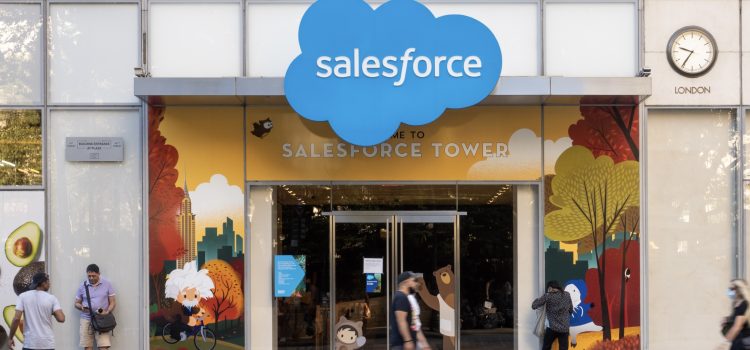

This article is an excerpt from the Shortform book guide to "Trailblazer" by Marc Benioff and Monica Langley. Shortform has the world's best summaries and analyses of books you should be reading.
Like this article? Sign up for a free trial here.
What are Salesforce’s core values? How does Salesforce promote inclusivity and excellent customer service?
Marc Benioff says that Salesforce became a Fortune 500 company by practicing principled business. Salesforce prioritizes four key moral principles: service, advancement, inclusivity, and confidence.
Let’s discuss how the company has translated each of these principles into action over its history.
1. How Salesforce Provides Service
One of Benioff’s primary motivations for starting Salesforce was to serve customers’ needs. He explains that as a child, he watched his father work tirelessly to manage the clothing business he owned—so as an adult, he endeavored to make business management easier, less time-consuming, and less expensive by providing software that could do much of the legwork. He was also inspired to prioritize service by an Indian guru who told him that his business should focus on helping others.
Benioff says that as one of Salesforce’s core values, it provides two major forms of service to its customers: First, it gives customers access to software that helps them more effectively manage their business and pull through tough times. For example, Benioff describes how Salesforce client Home Depot suffered after the 2007-2008 financial crisis because consumers no longer had the disposable income for home renovations and were turning to cheaper, more convenient alternatives like Amazon. To overcome these challenges, Salesforce designed software for making online sales as well as communications software for employees, which enabled them to share expert knowledge and therefore enhanced the unique value Home Depot offered to its customers.
The second way Salesforce provides service is via Dreamforce, its annual stakeholder conference. Dreamforce features entertainment, health-enhancement experiences like guided mindfulness practices, skill-building seminars and workshops, and educational discussions and speeches on the intersection of technology and social issues by notable people like Michelle Obama. Altogether, these activities contribute to attendees’ well-being and personal development, empowering them to cultivate a holistic approach to professional growth while fostering connections, insights, and inspiration that extend far beyond the realm of technology.
2. How Salesforce Pursues Advancement
To continue meeting customers’ ever-evolving needs, Benioff says Salesforce is dedicated to making technological and social advancements. He explains that three people influenced his decision to prioritize this principle: First, his grandfather, a lawyer and local politician responsible for the advent of Bay Area Rapid Transit (BART), instilled in him the importance of contributing to social causes. Second, before Benioff founded Salesforce, he worked at a company that then-Secretary of State Colin Powell challenged to donate resources to underprivileged youth. Third, Apple’s founder, Steve Jobs, told him that Salesforce needed to invent new technologies to stay relevant in a rapidly changing market.
In addition to the educational value Salesforce provides via Dreamforce, the company aims to advance global society by providing educational opportunities for a variety of people, including students, professionals, and marginalized communities. For example, its online learning platform Trailforce trains professionals for competency in emerging technologies such as AI, Vetforce provides job training to veterans, and other programs give schoolchildren access to technologies and mentors. Benioff says that by ensuring individuals have access to the resources they need to thrive in the digital age, Salesforce closes the skills gap that contributes to social inequality (and therefore to global conflict) and promotes economic development.
Benioff says Salesforce has also spearheaded several technological advancement initiatives. For example, at Steve Jobs’s behest, Salesforce created AppExchange, a platform where any developer can sell apps for business use. This effectively democratized app creation, leading to a flourishing network of novel solutions to diverse business needs and driving efficiency, agility, and competitiveness across industries.
Additionally, Benioff says Salesforce has made progress with AI applications, like its line of Einstein technologies designed to enhance and automate organizational decision-making, business administration, and customer service.
3. How Salesforce Practices Inclusivity
Benioff explains that while he’s always striven for inclusivity, he didn’t explicitly focus on this principle until two key incidents brought Salesforce’s underperformance in this area to his attention. The first issue was an audit that showed that women were being underpaid compared to men across the board.
Second, when Benioff tweeted that the technology industry could help end racial strife amid the protests that ensued after the police killings of Alton Sterling and Philando Castile in 2016, there was a controversy over the lack of racial diversity among Salesforce employees (only 2% were Black). Benioff says he learned from these experiences and began pouring resources into making Salesforce a more equitable company.
Benioff says that once he became aware of Salesforce’s shortcomings with regard to gender inclusivity, he took decisive action to transform the company into a more gender-egalitarian workplace. This began with the Women’s Surge program, which aimed to increase the number of women working at Salesforce and continued with efforts to standardize pay and promotion tracks for gender parity. In addition to these structural changes, Salesforce invests in education and awareness, offering workshops and training sessions to help managers and employees unlearn unconscious bias—a type of automatic, unintentional prejudice that can lead to inequitable treatment—and foster a more inclusive workplace culture.
Benioff explains that Salesforce also pursues racial, religious, and LGBT inclusivity in several ways. For example, after speaking to a Black employee who told him she felt Salesforce didn’t take inclusivity seriously enough, Benioff appointed a Chief Equality Officer to address that. Salesforce also donates resources, including employee time, to causes that train minority students in computer science competencies, and it makes an effort to hire a greater number of underrepresented minority employees through its recruitment programs. Finally, Salesforce encourages minority employees to connect with each other by creating safe, identity-based discussion groups.
4. How Salesforce Promotes Confidence
According to Benioff, it’s vital that all stakeholders have confidence in Salesforce, its leaders and employees, and each other. He learned this primarily by witnessing other companies undergo public crises of confidence—for example, Salesforce helped Toyota recover from the controversy that ensued when it knowingly failed to address safety issues with vehicles it manufactured, and Google suffered from mass public disapproval due to executives’ inappropriate handling of sexual harassment issues. Benioff also reasons that this confidence gives Salesforce a competitive edge—the company is more likely to attract and retain customers and employees if it has their confidence.
The primary way that Salesforce inspires stakeholders’ confidence is via accountability supported by transparent communication. Benioff says this often happens in relatively small ways—for example, executives livestream some of their meetings so that all employees have access to important company information, and the company has a website customers can consult to find out about the current operational status of Salesforce products and services, including any incidents or maintenance activities that may affect their availability.
Stakeholders often demand accountability and transparent communication from Benioff about large and contentious issues, too. One major example of this came in the form of a 2018 open letter to Benioff about Salesforce’s deal with US Customs and Border Patrol (CBP). Salesforce provided software to CBP for mundane purposes, like human resources management, and employees were concerned that Salesforce software was being used to facilitate the separation of migrant children from their parents, a Trump-era border policy widely deemed inhumane. The open letter called for Salesforce to re-evaluate its relationship with CBP and impose a system that would ensure Salesforce’s software could not be used nefariously in the future.
Benioff explains that this controversy was difficult to handle because stakeholders’ confidence needs seemed conflicted. While employees needed to have confidence in Salesforce’s ethics to stand behind their work, customers needed to have confidence that Salesforce wouldn’t abandon them if their values didn’t align with employees’ values. To resolve the issue, Salesforce issued a statement clarifying that its software was not being used to separate migrant families and promising to donate to organizations helping affected families. Salesforce didn’t drop CBP from its client list, but to meet employees’ demands, it instituted an Office of Ethical and Humane Use to develop a strategy ensuring responsible use of Salesforce products.

———End of Preview———
Like what you just read? Read the rest of the world's best book summary and analysis of Marc Benioff and Monica Langley's "Trailblazer" at Shortform.
Here's what you'll find in our full Trailblazer summary:
- What “principled business” means and why it matters to you
- The priority that Salesforce—a Fortune 500 company—puts before profit
- How capitalism can look different in the future






